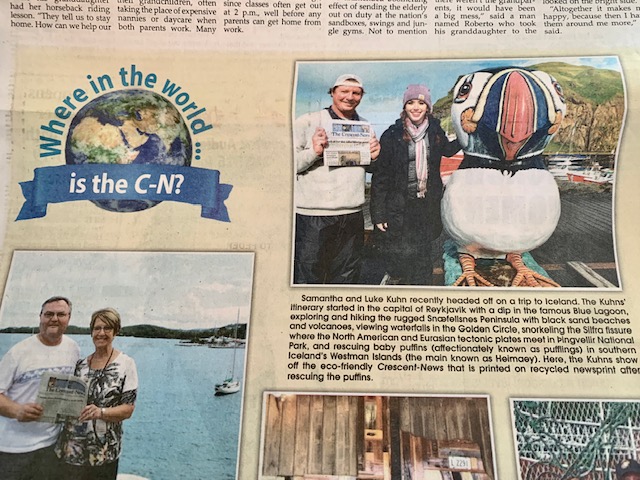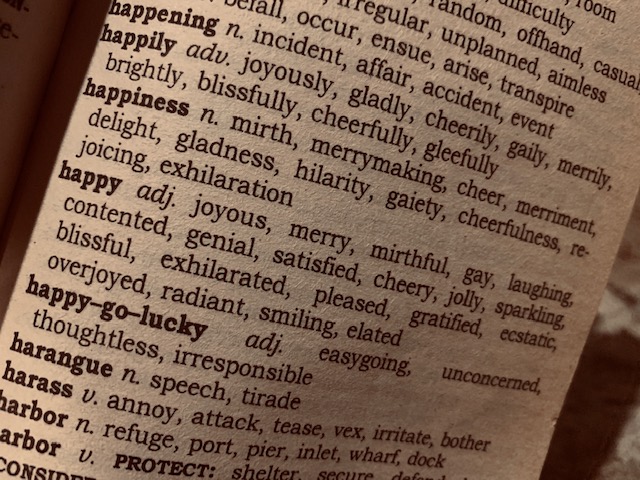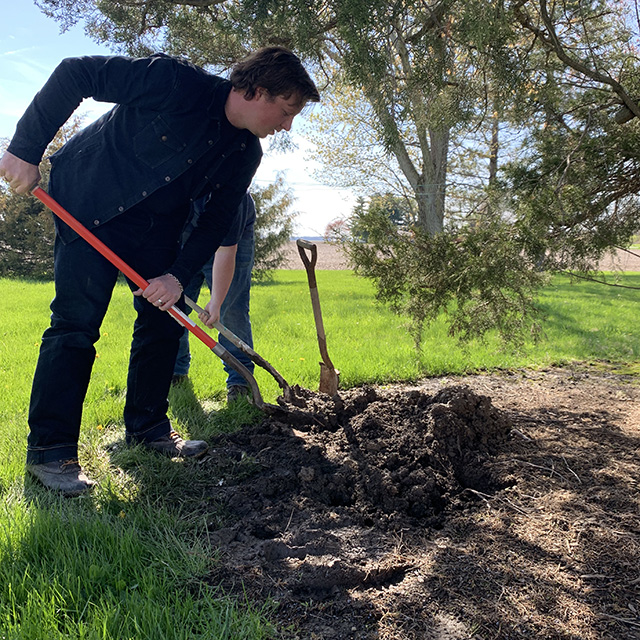I was taking my mother-in-law’s place at a local event when a stranger she knew approached me unexpectedly with a newspaper. It was a bit awkward.
“You’ll be seeing Kathy soon, right?” the elderly woman asked earnestly, smiling at me.
“Yeah, she should be home tomorrow,” I responded, returning the good spirit with a friendly smile. I, however, recognized the newspaper in her hand immediately, and something in my stomach dropped. It was a copy of the local paper that featured my husband and I’s recent trip to Iceland. We were smiling in front of a giant puffin statue in the Westman Islands, donning wool stocking hats, puffy coats, and an enthusiasm probably not understood at a glance by those in our rural northwest Ohio community.

Introvert social dread
Don’t ask me why, but as an introvert, I was dreading the idea of a conversation about that trip. I wasn’t prepared, didn’t know what to talk about, and honestly, didn’t know what I could say to make this stranger understand why my husband and I were so curious about the world. I was immediately exhausted by the prospect, and I surged into fight or flight mode, considering what this lady might think of me. What in the world would I say?
She proceeded to hand me the newspaper: “Can you please give this to Kathy? I think she might like it considering her son is in the photo.”
Heart racing, I tried to smile. “Of course! I’m sure she’ll like that” was all I could get out. I thanked her but was relieved she didn’t know the other person in the photo was me, so I wouldn’t have to discuss it… yet, what if she finds out later and thinks I’m a weirdo for not speaking up? I didn’t know what to do.
The lady then asked me “who I belonged to,” which I figured meant who my parents were (It’s a small town, so everyone around here knows everyone). I responded, nervously laughed, and then went about my business and tried to end the conversation with intentional silence. But it didn’t work. I could see the gears in the woman’s head turning.
After I finished and made my move to leave in a hurry, the woman pinned me again with a question: “You’re the one in that photo, aren’t you?”
My face gushed pink as I looked down at the floor. I had been caught.
The reality of being awkward
…WHY hadn’t I just mentioned that Luke was my husband from the get go? That simple fact would have solved everything. We could have gotten this out of the way at the start of the conversation, not doing this great “reveal” at the end where she caught me withholding information. The word “idiot” barely scratched the surface of how I felt.

This is just one of the many awkward encounters I have on a regular basis. (I’m sure you know the feeling.) And because I made such a large error at the start, I felt it was worth noting here. There was a lot I could have done differently. I have a vested interest in reducing the quantity of my awkward encounters, as well as their severity.
Lately, I’ve been analyzing how to better navigate awkward moments with honesty and poise, making sure I can at least leave the other party feeling positive (which, in turn, makes me more comfortable with the whole situation.)
Here’s what I’ve learned from being an awkward person for so very long:
1. Be honest. If you aren’t sure or can’t remember something, ask for clarification AT THE START.
I can’t emphasize this enough. If you have no idea what someone is talking about, but you let the conversation go for 5 minutes because you’re afraid to interrupt and look stupid, chances are that your entire interaction will be shallow, uncomfortable, and you’ll be looking for the exit the entire time. If within the first few minutes of conversation, you don’t ask someone to clarify, interrupt and say “Wait, who is this again?,” or ask them to repeat because you didn’t follow that, you can’t just ask that 10 minutes in and expect the person not to be hurt. It’ll look like you 100% were not listening, don’t care about them, and are the biggest jerk they know in that moment.
This comes down to basic listening 101. If you ask for clarification immediately, the person will know you’re engaged with their story; you can’t ask halfway down the road and expect their feelings to not be hurt.
You feel like an idiot in the moment for asking, but once their story is done, they won’t even remember you asked. It’s a win-win, and you still have the positive reinforcement of a successful bond at the end. The end goal of an interaction is bringing you closer to someone else on a human level, NOT how awkward you feel in the process. That fades away surprisingly quickly.
2. Don’t be afraid to show your weaknesses, flaws, or lack of knowledge.
This is especially true if it helps the other person feel more confident or assured in themselves. So long as you make the other party feel good about the interaction, they won’t leave with a negative connotation.
As researcher Brené Brown proves, when you show vulnerability, others are more likely to relate and reciprocate. It’s actually a powerful tool. After all, it’s perfectly normal and human to not know everything. So if you don’t know, just say “I really have no background in XYZ subject matter… what are your thoughts about it?” Another go-to I use is “I love learning from people who know a lot about X. If I open my mouth, I’ll probably embarrass myself.” This generally makes other people more at ease because they feel like you are now looking up at them, so they’re willing to look past whatever awkwardness just occurred.
It’s not about putting yourself down by any means, but the bottom line is this: Both parties get a lot further and have more productive conversation when the common thread involves an extent of self-deprecating, humble honesty aimed in the other person’s direction with the end goal of building him/her up.
3. Practice techniques for exiting with grace.
There’s nothing worse than slowly dying inside or blushing to death while you wait for the other person to end the interaction. Your mind is racing through possibilities, hoping they don’t ask another question or keep droning on. Trust me: we’ve all been there.
Don’t hold yourself victim to a soul-sucking conversation where you feel incredibly uncomfortable and are begging for an excuse to leave. You don’t need an excuse, someone doesn’t have to “rescue you,” and you don’t have to wait for the other person to say bye first. YOU have the control here.
It’s all about learning graceful exist strategies that show your appreciation for the other party’s time. As someone who struggles with social anxiety, I’ve experimented so many times with these variations. I now have a list of favorites that are tried, true, and leave the other party’s dignity feeling intact. Of course, it depends who I’m talking to (business or personal), but here are a few variations to experiment with:
- “Thanks so much for taking the time to catch up. I really have to get moving, but hopefully we’ll see each other again soon!”
- “This has been really nice! I feel like I’ve gotten to know another side of you… let’s do it again soon, OK?”
- “I hate to stop things now, but I don’t want to take up any more of your time. I’ll let you get back to work, but we’ll touch base again soon, OK?”
- “This has been incredibly productive, and I’m grateful for the opportunity. I have another commitment I have to get to, but don’t hesitate to reach out if you need anything, OK?”
- *Ask* “Do you by chance know what time it is?” *Person responds* “I hate to leave, but I have X I need to be at. It was really good seeing you.”

With a little practice and willingness to be vulnerable, awkward situations don’t have to be SO bad. Conversational creativity is an important social skill that requires regular honing.
Can you relate to this? How do you cope with awkward situations? We’d love to hear your tips!


